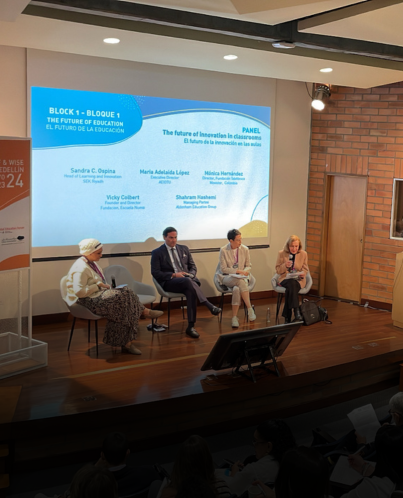Month: April 2023
How Schools Can Work With ChatGPT
Despite only being around for a few months now, ChatGPT has already had a huge impact on several industries – and could potentially transform the way that we interact with computers in our day-to-day lives. Not only can this AI tool write articles and essays, but it can also write computing code. While it may worry some, by working closely with ChatGPT, schools could make huge changes to the way students learn.
What is ChatGPT?
Everybody’s been talking about ChatGPT since it was launched in November 2022 – in fact, 100 million people around the world have used it since then. If you haven’t used it yet, or if you’ve only ever heard the name, ChatGPT stands for ‘Chat Generative Pre-trained Transformer.’ It’s a large language model, a kind of AI algorithm trained to understand and use language. Created by OpenAI, it can generate human-like answers to questions, and is capable of conversing on a huge range of topics. As well as answering questions, it can offer guidance and recommendations, and even write an essay or an article from scratch with just a simple brief. While it has a lot of benefits, many people are concerned about the impact that it could have – especially on today’s education system.
ChatGPT in schools
Ever since it launched, the effect of ChatGPT has got people worrying. Journalists, writers, computer programmers and graphic designers think AI tools could soon replace them. No one, however, is more concerned than teachers and others working in the education sector. Most people are fearful of ChatGPT’s impact on students, who could use it to cheat, and get it to write essays and do their homework for them. The way that ChatGPT generates original text means that it won’t be spotted by software that’s been designed to detect plagiarised content. In fact, some schools have already made the decision to ban ChatGPT. In the US, New York City’s Department of Education blocked it on all school devices and networks, citing concerns from teachers. A department spokesperson Jenna Lyle explained, “While the tool may be able to provide quick and easy answers to questions, it does not build critical-thinking and problem-solving skills, which are essential for academic and lifelong success.”
How have schools used it?
While banning ChatGPT might initially seem like a good idea, it may not be the most sensible action for schools to take. For one thing, it could drive more students to use it, encouraging them to find ways of getting around the ban. AI is quickly becoming a part of everyday life, so today’s students need to be learning how to use it now to ensure they’re not left behind. As Richard Culatta, CEO of the International Society for Technology in Education, pointed out, “kids in school today are going into jobs where not everyone they work with is human.” Rather than banning it, schools should be using ChatGPT and working with it.
It could be a powerful educational tool – and some teachers have already realised this. While some educators worried about the impact of ChatGPT, others began using it in the classroom, and incorporating it in their own lessons. For example, it can be used to help students write better, teaching them how to and think critically and analyse texts. Rather than getting ChatGPT to write essays, some teachers have used it to teach their students how to structure essays, by using the tool to create essay outlines, and then write out the essays by hand. This can help students gain a better understanding of the topic they’re learning about, and teach them how to make the most of an AI tool like ChatGPT at the same time. As well as helping students, ChatGPT can also help teachers. They can use it to automate repetitive tasks, like creating lesson plans, and even use it to personalise the learning experience for their students. By giving ChatGPT all the data it requires, teachers can create customised learning plans that cater to each student’s individual needs.
The importance of using technology
It’s important for schools to strike a balance with ChatGPT, and not ban it. Last month, it was announced that International Baccalaureate students were allowed to use AI-generated content in their essays. In the Middle East, meanwhile, the UAE’s education authorities have begun drafting guidelines on how generative AI technology could be used in schools – including using GPT-powered AI tutors in classrooms. Although ChatGPT is still in its early stages, it will continue to develop. The latest version of ChatGPT, GPT-4, was released just a few weeks ago, and is far more advanced than the previous version, so it’s difficult to predict how we’ll be able to use it in a few years’ time.
At Aldenham Education Group, we’ve always strived to offer our students the latest technologies. Not only does this help our students to engage with their education more, but it makes learning more accessible, and provides them with countless opportunities. By helping our students to learn new skills, and keep up with fast-paced technological changes, we’re preparing them for a world that does not yet exist. It’s why we’re embracing ChatGPT by learning how to incorporate it effectively both within the classroom and for our students in their own study time rather than exercising a knee-jerk ban out of fear.
This can be seen throughout our schools – at Aldenham School in the UK, for example, students can use a brain scanner in their Psychology lessons, and even learn how to write software in Computer Science. Students at our newest school, Aldenham Prep Riyadh, use interactive whiteboards in their lessons, and can access a VR system and video production software in the Learning Resource Centre. Our Computer Science students go on regular field trips to continue their learning and find out about some of the latest technological advances, visiting TechHub Incubators and showcasing what they’ve learned.
With the rise of ChatGPT, the age of artificial intelligence is here, and schools need to work with it rather than against it. While the new technology is disruptive, it’s here to stay, and it offers a range of benefits. Although we have over 400 years of tradition here at Aldenham, we’re constantly looking to the future, and have seen how technology can help our students to flourish. ChatGPT is just one of the many tools that could transform education – have a read of one of our recent blogs to see what other educational trends you should be watching out for.


